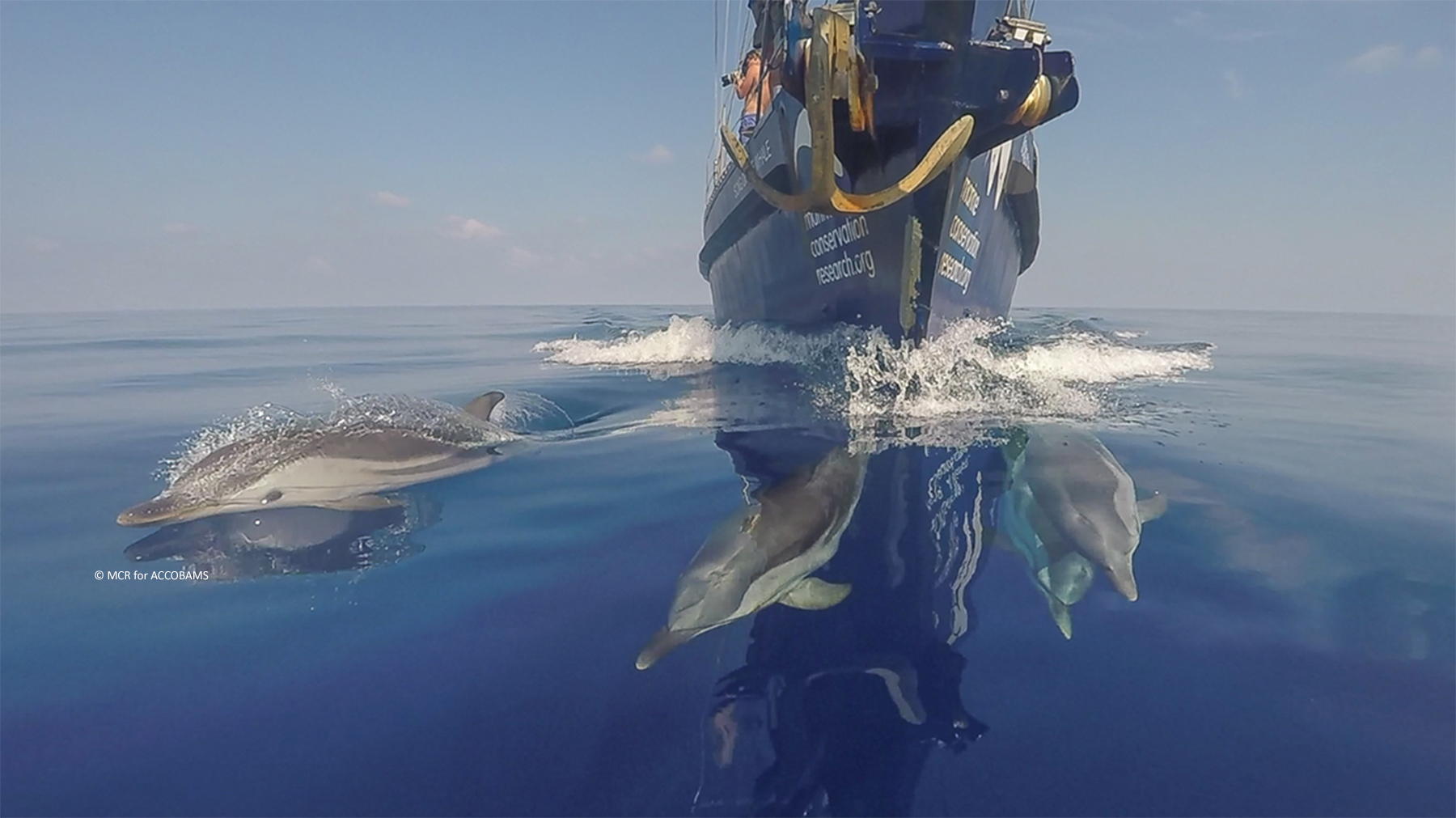ACCOBAMS Survey Initiative: a challenging macro synoptic regional assessment of cetaceans populations for the benefit of regional conservation and economic actors
(
Intergovernmental organization
)
#OceanAction40903
Description
The Permanent Secretariat to the Agreement on the Conservation of Cetaceans of the Black Sea, the Mediterranean and the Adjacent Atlantic Area (ACCOBAMS), will carry out the ACCOBAMS Survey Initiative (ASI) aiming at strengthening the governance conditions affecting cetacean species in order to reach and / or maintain these species and their habitats in a state of favorable conservation. Financial support will be provided by private donors (MAVA Foundation and Prince Albert II of Monaco Foundation) and the ACCOBAMS Parties.
In coordination and with the support of riparian countries and local scientists, the ASI will lead to the establishment of an integrated, collaborative and coordinated surveillance system for the status of cetacean populations. Such a tool is crucial in assessing the effectiveness of conservation efforts of local actors, and it will support national efforts to meet their commitments under the EU Marine Strategy Framework Directive and the Ecosystem Approach implemented by the Barcelona Convention (UNEP/MAP).
The collaborative and scientifically solidarity-based approach of this project will lead to a strengthening of the regional network of experts, in particular through the mobilization of an international task force for the 2018 Summer Survey campaign, and numerous capacity building actions for local actors and authorities in the surveillance of cetacean in their waters. The results of the survey will be cross-referenced with existing data on relevant indicators and will lead to 1/ confirmation of existing area of interest and identification of new ones (cetacean critical habitats) and 2/ promote, support and improve national or transnational systems and procedures for the conservation of cetaceans, including MPAs.
SDGS & Targets
Goal 14
Conserve and sustainably use the oceans, seas and marine resources for sustainable development
14.1
By 2025, prevent and significantly reduce marine pollution of all kinds, in particular from land-based activities, including marine debris and nutrient pollution
14.1.1
(a) Index of coastal eutrophication; and (b) plastic debris density
14.2
By 2020, sustainably manage and protect marine and coastal ecosystems to avoid significant adverse impacts, including by strengthening their resilience, and take action for their restoration in order to achieve healthy and productive oceans
14.2.1
Number of countries using ecosystem-based approaches to managing marine areas
14.3
Minimize and address the impacts of ocean acidification, including through enhanced scientific cooperation at all levels
14.3.1
14.4
By 2020, effectively regulate harvesting and end overfishing, illegal, unreported and unregulated fishing and destructive fishing practices and implement science-based management plans, in order to restore fish stocks in the shortest time feasible, at least to levels that can produce maximum sustainable yield as determined by their biological characteristics
14.4.1
14.5
By 2020, conserve at least 10 per cent of coastal and marine areas, consistent with national and international law and based on the best available scientific information
14.5.1
14.6
By 2020, prohibit certain forms of fisheries subsidies which contribute to overcapacity and overfishing, eliminate subsidies that contribute to illegal, unreported and unregulated fishing and refrain from introducing new such subsidies, recognizing that appropriate and effective special and differential treatment for developing and least developed countries should be an integral part of the World Trade Organization fisheries subsidies negotiation
14.6.1
Degree of implementation of international instruments aiming to combat illegal, unreported and unregulated fishing
14.7
By 2030, increase the economic benefits to Small Island developing States and least developed countries from the sustainable use of marine resources, including through sustainable management of fisheries, aquaculture and tourism
14.7.1
Sustainable fisheries as a proportion of GDP in small island developing States, least developed countries and all countries
14.a
Increase scientific knowledge, develop research capacity and transfer marine technology, taking into account the Intergovernmental Oceanographic Commission Criteria and Guidelines on the Transfer of Marine Technology, in order to improve ocean health and to enhance the contribution of marine biodiversity to the development of developing countries, in particular small island developing States and least developed countries
14.a.1
14.b
Provide access for small-scale artisanal fishers to marine resources and markets
14.b.1
Degree of application of a legal/regulatory/policy/institutional framework which recognizes and protects access rights for small‐scale fisheries
14.c
Enhance the conservation and sustainable use of oceans and their resources by implementing international law as reflected in United Nations Convention on the Law of the Sea, which provides the legal framework for the conservation and sustainable use of oceans and their resources, as recalled in paragraph 158 of "The future we want"
14.c.1
Number of countries making progress in ratifying, accepting and implementing through legal, policy and institutional frameworks, ocean-related instruments that implement international law, as reflected in the United Nations Convention on the Law of the Sea, for the conservation and sustainable use of the oceans and their resources
SDG 14 targets covered
| Name | Description |
|---|---|
| 14.2 | By 2020, sustainably manage and protect marine and coastal ecosystems to avoid significant adverse impacts, including by strengthening their resilience, and take action for their restoration in order to achieve healthy and productive oceans |
| 14.5 | By 2020, conserve at least 10 per cent of coastal and marine areas, consistent with national and international law and based on the best available scientific information |
| 14.a | Increase scientific knowledge, develop research capacity and transfer marine technology, taking into account the Intergovernmental Oceanographic Commission Criteria and Guidelines on the Transfer of Marine Technology, in order to improve ocean health and to enhance the contribution of marine biodiversity to the development of developing countries, in particular small island developing States and least developed countries |
Deliverables & Timeline
Resources mobilized
Partnership Progress
| Title | Progress Status | Submitted |
|---|---|---|
| Partnership Progress 2019-07-05 | On track |

Feedback
Action Network

Timeline
Entity
SDGs
Geographical coverage
Other beneficiaries
Ocean Basins
Communities of Ocean Action
More information
Countries
Contact Information
Susana SALVADOR, Executive Secretary

